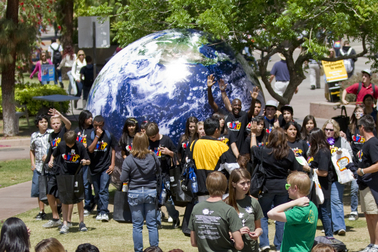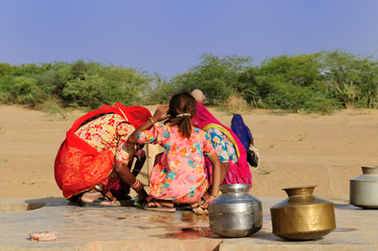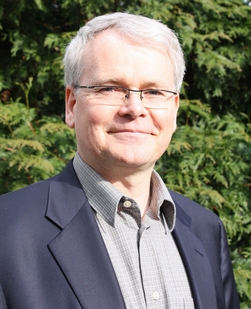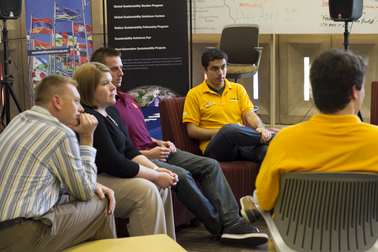Obama reappoints Sustainability Scientist to Committee on the National Medal of Science
View Source | April 11, 2013
 Arizona State University Professor Carlos Castillo-Chavez has been reappointed to the U.S. President’s Committee on the National Medal of Science.
Arizona State University Professor Carlos Castillo-Chavez has been reappointed to the U.S. President’s Committee on the National Medal of Science.
Castillo-Chavez is a Regents’ Professor and a Joaquin Bustoz Jr. Professor at ASU. He is a faculty member in ASU's School of Sustainability and a Distinguished Sustainability Scientist in ASU's Global Institute of Sustainability. President Obama first appointed him to the President’s Committee on the National Medal of Science in 2010.
The 12-member committee evaluates and nominates fellow scientists for the National Medal of Science—one of the field's highest honors. Nominated scientists come from the physical, biological, mathematical or engineering sectors.
Upon his reappointment, President Obama said: “I am grateful that these impressive individuals have chosen to dedicate their talents to serving the American people at this important time for our country. I look forward to working with them in the months and years ahead.”







 Researchers at Arizona State University, including Sustainability Scientist Marco Janssen, are using games to learn about water resource sharing and cooperation among people.
Researchers at Arizona State University, including Sustainability Scientist Marco Janssen, are using games to learn about water resource sharing and cooperation among people.
 The School of Sustainability at Arizona State University has announced its new dean effective July 1, 2013. Christopher Boone, a professor at the School of Sustainability and School of Human Evolution and Social Change, has served as the associate dean for education of the School of Sustainability since July 2010. Boone has been with ASU since 2006 and is a member of the executive committees of the School of Sustainability and the Global Institute of Sustainability.
The School of Sustainability at Arizona State University has announced its new dean effective July 1, 2013. Christopher Boone, a professor at the School of Sustainability and School of Human Evolution and Social Change, has served as the associate dean for education of the School of Sustainability since July 2010. Boone has been with ASU since 2006 and is a member of the executive committees of the School of Sustainability and the Global Institute of Sustainability.

 Britain’s Sir Crispin Tickell will be visiting Arizona State University to discuss “The Human Future” on Thursday, April 11, from 6:00-7:30 p.m. at the Tempe Center for the Arts in the Lakeside Room.
Britain’s Sir Crispin Tickell will be visiting Arizona State University to discuss “The Human Future” on Thursday, April 11, from 6:00-7:30 p.m. at the Tempe Center for the Arts in the Lakeside Room.

 ASU's first
ASU's first  University gymnast Kahoku Palafox recently graduated magna cum laude with a degree in sustainability from Arizona State University's School of Sustainability. She submitted a case study to the Green Sports Alliance that outlined Sun Devil Athletics’ sustainability and conservation practices. Palafox explained the processes behind making ASU's sports events sustainable, like zero-waste practices and energy conservation.
University gymnast Kahoku Palafox recently graduated magna cum laude with a degree in sustainability from Arizona State University's School of Sustainability. She submitted a case study to the Green Sports Alliance that outlined Sun Devil Athletics’ sustainability and conservation practices. Palafox explained the processes behind making ASU's sports events sustainable, like zero-waste practices and energy conservation.


 A team of researchers from Arizona State University, Stanford University, and the Carnegie Institution for Science has found that future sugar cane plantations can help Brazil increase its ethanol production, while also decreasing regional temperature.
A team of researchers from Arizona State University, Stanford University, and the Carnegie Institution for Science has found that future sugar cane plantations can help Brazil increase its ethanol production, while also decreasing regional temperature.
 The Sustainability Initiatives Revolving Fund (SIRF) annual report highlights a dozen energy-reduction projects at ASU that were supported by SIRF funds during FY2012.
The Sustainability Initiatives Revolving Fund (SIRF) annual report highlights a dozen energy-reduction projects at ASU that were supported by SIRF funds during FY2012.

 The U.S. Environmental Protection Agency (EPA) recognized Arizona State University’s
The U.S. Environmental Protection Agency (EPA) recognized Arizona State University’s